Don’t Get Tanked: Essential Steps for Propane Gas Leak Repair
By Brian on September 19, 2025
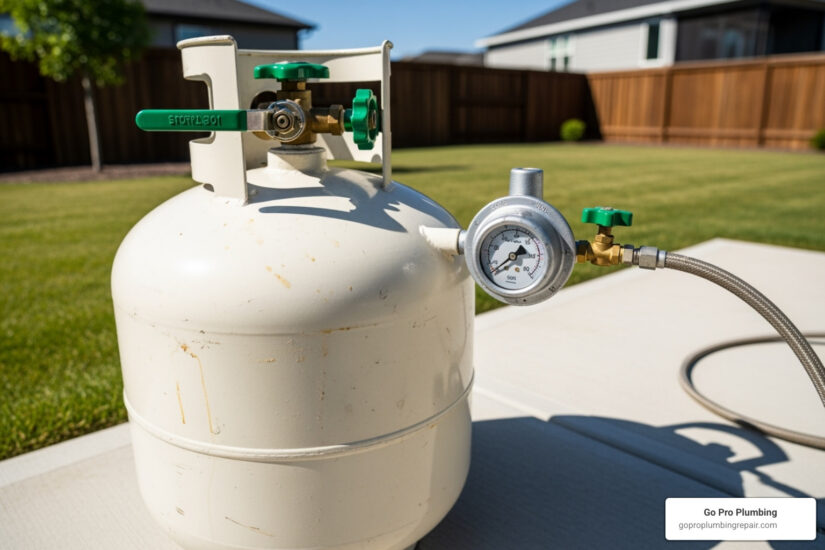
Why Immediate Action is Critical for Propane Gas Leak Safety
Propane gas leak repair requires immediate professional attention to prevent serious health risks and potential explosions. If you smell gas, hear hissing, or see frost on your propane equipment, evacuate immediately and call 911.
Quick Response Guide for Propane Leaks:
- Turn off the main propane valve immediately
- Evacuate everyone from the area
- Avoid all flames, sparks, and electrical switches
- Call 911 and your propane supplier from a safe distance
- Do not return until professionals declare it safe
Propane is a common and generally safe fuel for many Northern California homes, but a leak can turn deadly fast. It displaces oxygen, making breathing difficult. Low exposure causes dizziness and nausea, while high exposure can lead to convulsions or loss of consciousness.
Unlike natural gas, propane is heavier than air and settles in low areas like basements, creating hidden danger zones. Its distinctive “rotten egg” smell comes from an additive, as pure propane is odorless.
Federal law prohibits homeowners from repairing propane systems themselves. Only licensed professionals have the training and equipment to safely fix propane leaks. DIY repairs are not just dangerous—they’re illegal.
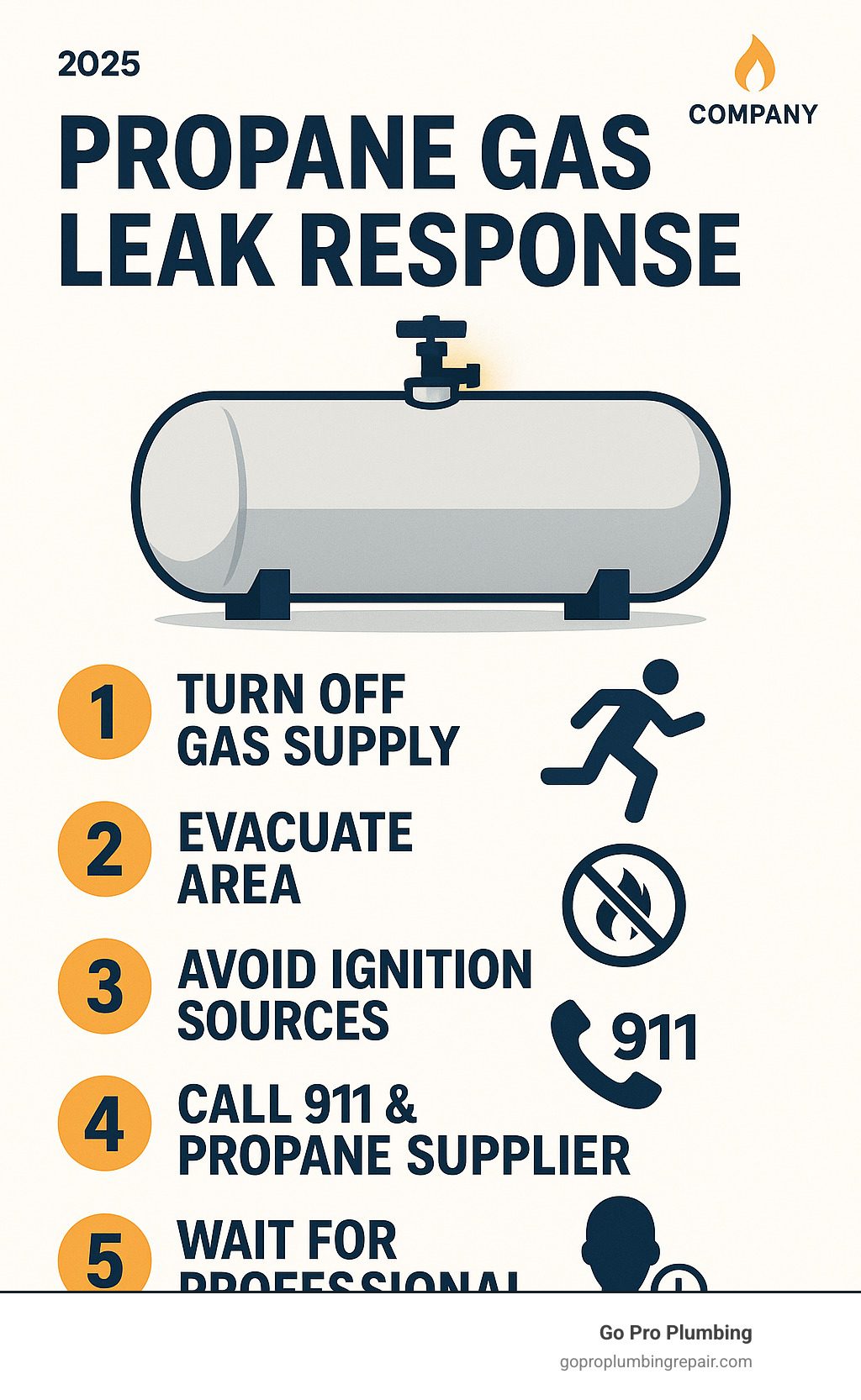
Propane gas leak repair terms at a glance:
Safety First: Immediate Steps for a Suspected Propane Leak
When you suspect a propane gas leak repair situation, every second counts. If you smell the distinctive rotten egg odor, hear a hissing sound, or see other signs of a leak, follow these critical steps without hesitation.
1. Evacuate Everyone Immediately
Your first priority is to get everyone out—family, pets, anyone nearby. Leave personal belongings behind. If it doesn’t slow your evacuation, open windows and doors as you exit to help ventilate the area.
2. Avoid All Flames and Sparks
Do not light matches, smoke, or use candles. Don’t operate light switches, use your phone, or start a nearby car. Even small sparks from electronics like flashlights or garage door openers can ignite propane gas.
3. Shut Off the Gas Supply (If Safe)
If the leak is outside and you can safely reach the main valve on your propane tank without entering a gas cloud, turn it clockwise to shut off the supply. If you have any doubt about your safety, leave it for the professionals.
4. Call for Help from a Safe Distance
Once you are well away from the leak, call 911 first, then your propane supplier. Provide your exact location and any details you noticed about the leak.
5. Do Not Return Until Cleared
Do not re-enter the area until emergency responders or a certified technician has declared it safe. They use specialized equipment to ensure all gas has dissipated. For more detailed guidance, see Propane Leak Safety: Detecting and Responding to Leaks.
Health Risks of Propane Exposure
The primary health danger from propane is not toxicity, but asphyxiation. Propane displaces oxygen, which can quickly become life-threatening.
- Low exposure symptoms mimic general illness and include dizziness, nausea, headaches, drowsiness, and coughing. If you feel this way and suspect a leak, get to fresh air immediately.
- High exposure symptoms are medical emergencies and can include convulsions, loss of consciousness, and heart failure. Call 911 after getting the person to safety.
- Frostbite from liquid propane is another risk. Leaking liquid propane is extremely cold (-44°F) and can cause severe frostbite on contact. Never touch it.
Understanding these risks makes it clear why propane gas leak repair must be left to professionals and why your first response is always to evacuate.
How to Detect a Propane Leak: The Three Senses
Your own senses are your best early warning system for detecting a propane gas leak repair issue. Propane manufacturers add a chemical, ethyl mercaptan, to the naturally odorless gas to make detection easier.
- Smell: The most common sign is the distinctive “rotten egg” or skunk-like odor. If you catch a whiff of this, trust your instincts and act immediately. Some conditions or medical issues can make the odor harder to detect, so never rely on smell alone.
- Sound: Listen for hissing or whistling noises near your propane tank, regulator, or gas lines. These sounds indicate gas escaping under pressure.
- Sight: Look for visual clues like frost or ice forming on your tank, valves, or lines, which occurs as escaping liquid propane vaporizes. Another sign can be dead or discolored vegetation near your outdoor gas lines, indicating a slow leak.
The Soapy Water Test: A Safe Way to Pinpoint a Leak
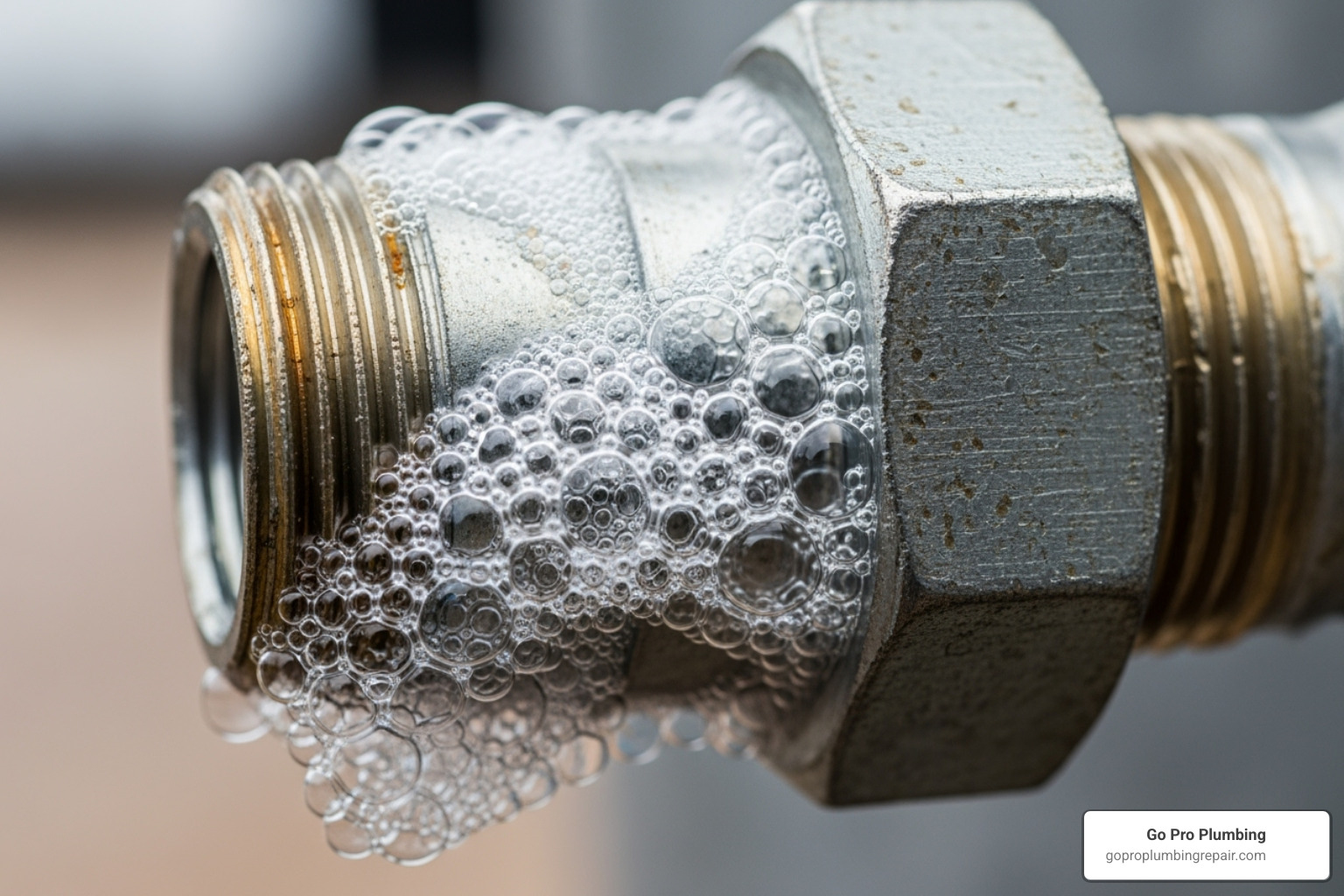
If you suspect a minor outdoor leak and can safely approach the area, the soapy water test can help pinpoint the source.
- Create the solution: Mix equal parts dish soap and water in a spray bottle or bowl.
- Apply the solution: With appliances off, generously spray or brush the soapy mixture onto all connections, fittings, hoses, and valve areas of your propane system.
- Look for bubbles: Watch carefully. The formation of bubbles indicates the exact location of a leak. The larger the bubbles, the more significant the leak.
Important: Only use this test for suspected minor leaks in a well-ventilated outdoor area. If you smell strong gas indoors or hear a loud hiss, skip this test, evacuate immediately, and call 911. While you can detect a leak, all repairs require professional expertise. For more on system upkeep, see our guide on gas line maintenance.
The Professional Propane Gas Leak Repair Process
When it comes to propane gas leak repair, there is one golden rule: leave it to licensed professionals.
DIY propane repairs are extremely dangerous and illegal in most places, including Northern California. Propane systems are under high pressure, and improper work can lead to fires or explosions. Attempting your own repairs can also void your homeowner’s insurance and lead to significant legal liability. Certified technicians have the training, specialized tools, and knowledge of safety codes to handle repairs safely.
A critical step professionals take is pressure testing after a repair. They pressurize the system with air to confirm it is completely sealed and leak-free, a crucial safety check that homeowners cannot perform safely or accurately. For gas issues, qualified plumbers are your best resource. Learn more on our Can a Plumber Fix a Gas Leak? page.
Common Causes of Propane Leaks
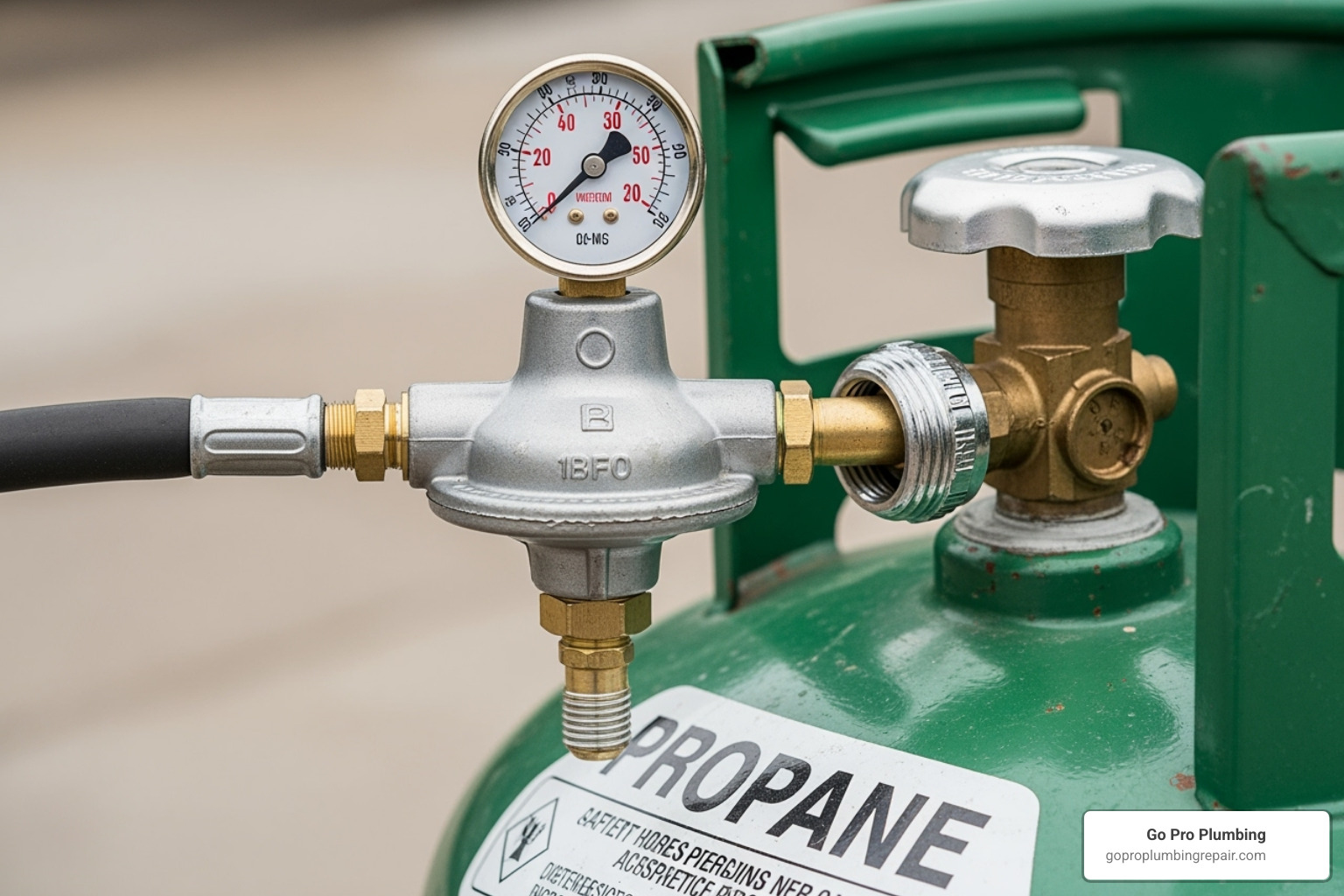
Understanding common causes can help prevent leaks. Key culprits include:
- Faulty connections: Loose or damaged fittings, threads, gaskets, or O-rings at connection points.
- Damaged hoses and lines: Cracks or physical damage to flexible hoses from sun exposure, or corrosion on metal lines from moisture.
- Overfilled tanks: Tanks filled beyond 80% capacity can build excessive pressure, forcing the relief valve open.
- Expired tanks: Portable tanks typically expire after 12 years and become unsafe to use without recertification.
- Valve malfunctions: The main tank valve or the pressure relief valve can fail due to wear or damage.
For professional help with these issues, see our Gas Pipe Leak Repair services.
Understanding the Propane Regulator’s Role in a Leak
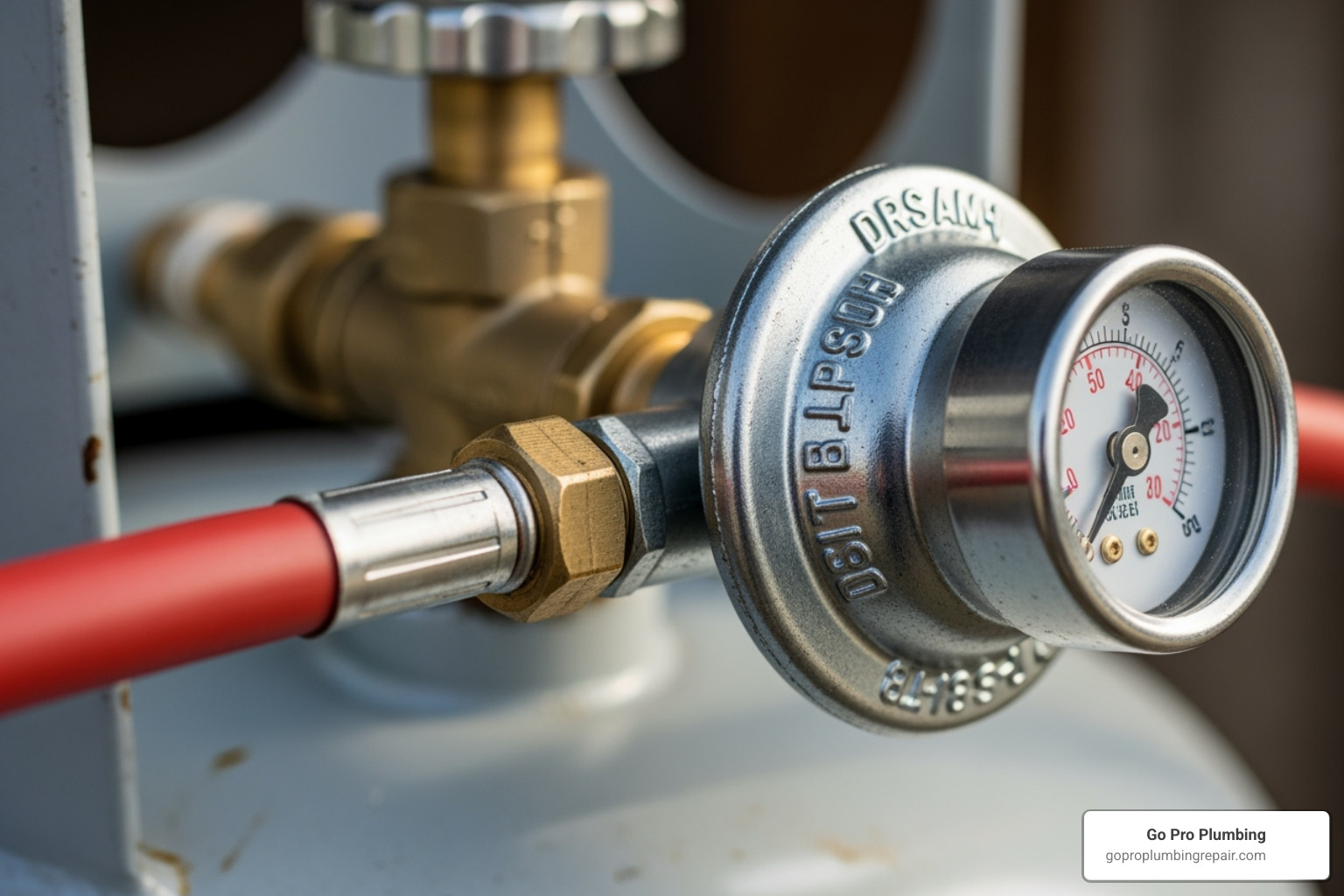
The propane regulator is a vital safety device that reduces the high pressure from the tank to a low, usable pressure for your appliances. A failing regulator can cause a leak or affect appliance performance.
Signs of a failing regulator include:
- The smell of gas near the tank.
- Inconsistent or yellow/orange flames on appliances.
- Pilot lights that won’t stay lit.
- A hissing sound or frost on the regulator itself.
Regulators have a lifespan of 10-15 years and should be proactively replaced to prevent failure. If you suspect an issue, contact us for Gas Line Regulator Installation.
Propane vs. Natural Gas Leaks: Key Differences
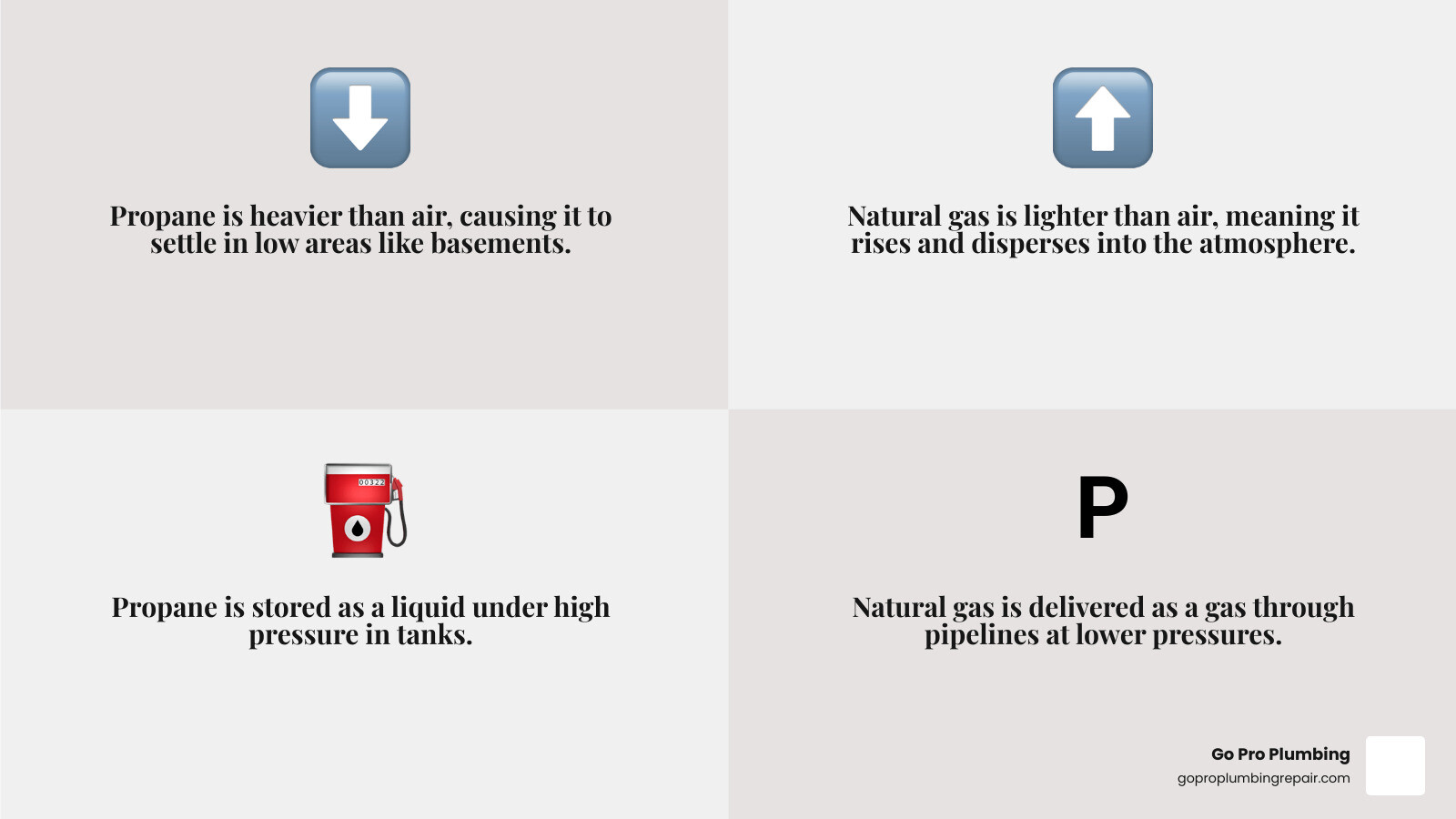
While both gases are flammable, they behave differently during a leak. The main difference is density.
- Propane is heavier than air, so it sinks and pools in low-lying areas like basements and crawl spaces.
- Natural gas is lighter than air, so it rises and dissipates more easily.
This difference is critical for evacuation. With a propane leak, you must immediately clear any lower levels of a building. Both gases are given a “rotten egg” smell for detection, and any leak requires immediate evacuation and a call to professionals.
Prevention is Key: Maintaining Your Propane System
The best propane gas leak repair is the one you never have to make. Proactive maintenance is essential for protecting your family and home.
- Schedule Annual Professional Inspections: Have a qualified technician thoroughly inspect your entire propane system—tank, regulators, lines, and connections—at least once a year. They can spot subtle issues like stress cracks or early corrosion before they become dangerous leaks.
- Practice Safe Tank Storage: Always store propane tanks upright and outdoors in a well-ventilated area, away from direct sunlight and heat sources. Never bring them into a garage, basement, or any indoor space, as leaking propane can pool in low areas.
- Check Tank Expiration Dates: Most portable propane tanks have a 12-year lifespan before they need recertification. The date is stamped on the tank’s collar. Using an expired tank is a significant safety risk.
- Protect Components from Weather: Use regulator covers to shield them from rain and sun. Regularly inspect hoses for cracks or brittleness and check pipes for corrosion. Replace any damaged components immediately.
- Educate Your Household: Make sure everyone recognizes the “rotten egg” smell of propane and knows the evacuation plan. Install propane gas detectors in areas where the gas might settle, such as basements or near floor-level appliances.
For businesses, these same principles apply. We provide comprehensive Commercial Gas Safety Checks to ensure workplace safety.
Frequently Asked Questions about Propane Leaks
Here are straightforward answers to common questions about propane gas leak repair and safety.
Can a homeowner legally perform a propane gas leak repair?
No. It is illegal and extremely dangerous for an unlicensed person to work on gas lines. Federal and local regulations require that any repairs be performed by a licensed and certified professional. DIY gas work can void your homeowner’s insurance and poses a severe risk of fire or explosion. For safety and legal compliance, always call a professional.
How often should my propane system be inspected?
We recommend a complete professional inspection of your propane system at least once a year. This includes the tank, regulators, lines, and all appliance connections. You should also schedule an inspection if you suspect a problem, after a severe weather event, or if your regulator is approaching its 10-15 year lifespan.
What should I do if my propane tank is overfilled?
An overfilled tank is a serious hazard because there is no room for the liquid propane to expand with temperature changes, creating dangerous pressure. If you suspect your tank is overfilled:
- Do not use any connected appliances.
- Do not attempt to move the tank or release the pressure yourself.
- Call your propane supplier immediately from a safe distance. They have the training and equipment to handle the situation safely.
- Keep everyone away from the tank and avoid any ignition sources nearby.
Your Local Experts for Safe and Reliable Gas Line Services
When it comes to propane gas leak repair, your safety is the top priority. At Go Pro Plumbing, we are committed to helping Northern California homeowners stay safe with reliable, professional gas line services.
Remember the critical steps for a suspected leak: detect the signs, evacuate the area immediately while avoiding ignition sources, and call for professional help from a safe distance. Never attempt to fix a gas leak yourself—it’s dangerous, illegal, and can void your insurance.
Our certified technicians understand that gas emergencies require a rapid response. We offer same-day service, bringing years of experience and specialized equipment to resolve your issue safely and efficiently. We don’t just fix the problem; we provide peace of mind by explaining the repair and how to prevent future issues.
For expert assistance with any Emergency Gas Line Service, trust our certified technicians to restore safety to your home. Because when it comes to propane gas leak repair, you deserve professionals who care as much about your family’s safety as you do.
